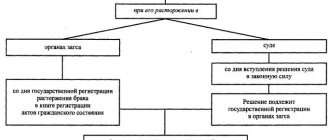The result of every divorce process is the dissolution of family relationships. The date from which the union is officially declared invalid is classified as the moment of termination of the marriage. The basis is family law, which is represented by the Family Code, Article 25. The title document confirming the end of the divorce process is the registration certificate.
The result of the divorce process is the dissolution of the family union
Family Code on the moment of termination of marriage.
If the marriage was dissolved through the registry office, the marriage is terminated from the date of state registration of the marriage in the civil register.
Everything is a little simpler here. Divorce in court is confirmed by a corresponding court decision. The spouses receive a court decision on divorce. Based on this document, the civil registry office issues a certificate of divorce.
The moment of termination of marriage upon its dissolution is prescribed in Article 25 of the Family Code of the Russian Federation. According to paragraph 1 of this article, a marriage dissolved in court is terminated from the day the court decision enters into legal force. Paragraph 2 states that divorce in court is subject to state registration in the manner established by law for state registration of civil status acts.
Within three days from the date the court decision on divorce enters into legal force, the court is obliged to send an extract from the decision to the civil registry office at the place of state registration of the marriage. Until the spouses receive a certificate of divorce, none of them has the right to enter into a new marriage. A divorce certificate can be obtained from the civil registry office at the place of residence of either spouse. By contacting a civil lawyer, you can be sure that a professional will do everything possible to defend your interests in court.
How is the date of entry into force of the court determined? This is stated not in the Family Code of the Russian Federation, but in another law - the Civil Procedure Code of the Russian Federation. Article 209 of the Code of Civil Procedure of the Russian Federation states that court decisions come into force after the expiration of the period for appeal, if they have not been appealed. This period is one month from the date the decision is made in final form. That is, after 1 calendar month.
But if the court decision was appealed to the appellate instance, the decision will come into force after the appeal court considers this appeal. In fact, on the day the appellate court makes a decision on the complaint.
Of course, in practice it is extremely rare that a court decision on divorce is appealed. A marriage cannot be saved if one of the parties to the marriage does not want it. But, nevertheless, there is no prohibition on appealing the court decision. That's why this happens in life. And sometimes this is legally extremely significant. Thus, in judicial practice, there is a category of inheritance cases in which the spouse of the testator becomes the legal heir if the death of the testator occurred before the court decision on divorce came into force.
In the Resolution of the Plenum of the Supreme Court dated May 29, 2012. No. 9 “On judicial practice in inheritance cases” directly states:
28. The circle of heirs by law is established by Articles 1142 - 1145, 1147, 1148 and 1151 of the Civil Code of the Russian Federation. Relationships entailing a call to inheritance by law are confirmed by documents issued in the prescribed manner. When resolving questions about determining the circle of heirs of the first priority according to the law, the courts should take into account that in the event of a divorce in court, the former spouse of the testator is deprived of the right to inherit in the specified capacity if the corresponding court decision entered into legal force before the day the inheritance was opened.
Thus, if the court decision has not entered into legal force, the testator’s ex-spouse is not deprived of the right to inherit.
Legal consequences of divorce
The legal consequences of divorce are the complete cessation of property and personal relationships that were established between the spouses during their cohabitation and housekeeping. However, legal relations are not always terminated in full. This is impossible if the following reasons exist:
- The spouses have children who are in their care, and one of the parents is burdened with the issue of maintaining the child through alimony payments;
- If an agreement is concluded between the spouses, which in one way or another regulates the mode of use of joint property.
As a rule, disputes regarding:
- Division of material assets belonging to spouses;
- Making payments for the maintenance of the second spouse recognized as disabled;
- Maintenance of children who have not reached the age of 18 or are recognized as incompetent.
These issues can be resolved both during the marriage and after its termination. The only condition is that a written statement from one of the spouses is required to resolve disputes.
When resolving disputes of a material nature, it is also worth remembering that, in accordance with the provisions of clause 7 of Article 38 of the RF IC, the statute of limitations on matters of division of property will be 3 years.
Separately, it is necessary to touch upon the issue of preserving the surname. The spouse who acquired a new surname as a result of marriage must independently decide whether to leave it or return to his previous surname.
Author of the article
Kuznetsov Fedor Nikolaevich
More than 15 years of experience in the legal field; Specialization - resolution of family disputes, inheritance, property transactions, disputes over consumer rights, criminal cases, arbitration processes.
Previous legislation
The provisions of the Family Code of the Russian Federation on the moment of termination of a marriage upon its dissolution through the court are fundamentally new for family law in our country. Previously, in accordance with Article 40 of the Code on Marriage and Family, both a marriage dissolved through the registry office and a marriage dissolved in court terminated from the moment the corresponding entry was made in the civil registration book. At the same time, the Code on Marriage and Family (CMF) did not establish a specific period during which divorced spouses had to register the court decision in the manner prescribed by law.
Spouses could apply to the registry office to obtain a divorce certificate whenever they considered it necessary. Accordingly, the marriage was considered legally existing until the court decision on divorce was registered by the spouses with the registry office. The law also did not provide for forced execution of court decisions on divorce. The three-year period for the forced execution of court decisions in civil cases, which was established by Article 345 of the Code of Civil Procedure of the RSFSR, did not apply to cases of divorce. This gave rise to a number of problems and introduced uncertainty into the relationship between spouses after the court decision entered into legal force.
Clause 1 of Art. 25 of the RF IC eliminates uncertainty in the settlement of marriage and family relations after the court makes a decision on divorce. Amendments to this law have been in effect since May 1, 1996. Consequently, marriages dissolved before May 1, 1996 are considered terminated from the moment of state registration of divorce in the civil registry office. So, if the spouses divorced before May 1, 1996 and did not receive a divorce certificate from the registry office, they are still legally considered legal spouses with all the ensuing rights (common property, inheritance).
If the marriage was dissolved in court after May 1, 1996, when new rules for state registration of divorce were already in effect, it terminates from the moment the court makes a decision on divorce. According to paragraph 2 of Art. 25, the court within three days sends an extract from the divorce decision to the registry office where the marriage was registered. The extract must be properly executed and contain information that is necessary for registering the divorce and entry in the civil registration book.
Dissolution of a marriage due to the death of a spouse
Article 16 of the Family Code regulates the conduct of a special procedure for dissolution of a marriage union associated with the death of a representative of a married couple. The fact of termination is confirmed based on the following circumstances:
- documented fact of death;
- recognition of death by the court.
In both cases, no special documents are required to confirm a dissolved marriage. A marriage at the official level is dissolved from the moment of death of one of the representatives of the married couple or from the date of entry into legal force of the decision recognizing the fact of death. The fundamental document certifying the moment of divorce due to the death of a spouse is the death registration certificate provided by the territorial civil registry office.
After divorce, the legal relationship between parents and children continues to apply.
The difference between the moment of termination of the marriage and the date of actual termination of the marriage relationship
Thus, there is a big difference between the moment the marriage ends and the date the marriage relationship actually ends. When these dates coincide, the court divides the property on the date of the court's decision on divorce. If the dates do not coincide (a more common situation) - on the day of the actual termination of the marriage and family relationship.
Of course, the date of actual termination of the marriage relationship plays a key role if the division of jointly acquired property is planned. If this is not the case, it does not have a special role in dissolving the marriage.
The moment of termination of marital relations is the same for any court case on divorce, and it is determined strictly according to the rules specified by me in paragraph 1 of this article.
Legal significance of determining the moment of divorce
Determining the moment of dissolution of a marriage has priority in the legal field. As soon as this fact receives documentary confirmation, legal relations of any kind between representatives of the married couple are terminated. The exception is the change of surname and compensation agreed upon in the marriage contract, if one has been concluded. After a divorce, the property regime ceases to apply. However, the legal relationship between parents and children continues to apply.
The moment of termination of the union has priority in determining the rights of a married couple after a divorce procedure. The Family Code, Article 25 clearly defines the onset of this moment depending on the body conducting the divorce procedure.
Additional nuances
The longer spouses are married, the more property they have to divide in the event of a divorce. And there are situations when it is unknown which of them can claim what:
- Business. If the business was started during marriage, then the company (or capital) is divided in half between the husband and wife. The exception is cases where spouses have entered into a marriage contract.
- Land plot. There are many disputes, the object of which is the land. By law, spouses can divide the plot voluntarily. This can be done by allocating shares or providing compensation payments. The court will do the same if you file a lawsuit. If the plot is indivisible, then one of the spouses may be allocated other property or money from the sale of the plot.
- Maternal capital. A certificate for receiving this money is issued to one of the parents and most often this is the mother. Such financial assistance has a specific purpose and therefore cannot be divided during a divorce. In addition, despite the name on the documents, the right to swear. Children primarily have capital.
When property disputes arise, it is best to contact lawyers to receive appropriate assistance.
Invalid marriage
A marriage union to which the term “invalid” can be applied is most often fictitious. Whatever the reason for entering into such a marriage, it does not create any rights and obligations for the spouses. This means that the consequences of declaring a marriage invalid will be somewhat different.
First of all, this concerns property. Since the marriage is not real, then there can be no talk of any common property. Even if the case goes to court, the property can be divided in accordance with the registered title. For example, if the apartment is registered in the name of the husband, then the wife cannot claim half of it.
The court may allocate a share of the property to one of the spouses, but only if a significant contribution to this property is proven. For example, this could be a serious financial investment, personal physical labor, etc. But it is quite difficult to prove this.
There is also the concept of “marriage restoration.” This procedure is most often used if a missing person has returned. In this case, his spouse can dissolve the marriage unilaterally through the court. But when he returns, there is talk of restoring relations. This procedure has certain legal consequences.
If the court restores the marital relationship of the spouses, then their rights and obligations will be resumed. And property ones too. There are no special rules governing the consequences of a restored marriage. From a legal point of view, the marriage is not considered terminated.
Legal consequences of divorce
Divorce is a procedure that terminates all personal and property relations between spouses. Therefore, the legal consequences include the following facts:
- Property acquired after a divorce does not become community property.
- That property that is considered common is divided between husband and wife by agreement, agreement or through court.
- The place of residence of joint young children is determined.
- When a child is born within 300 days after the divorce, his former spouse is automatically recognized as his father.
- The procedure for paying alimony is often established. One of the spouses or children can count on them.
These are the main nuances that should be taken into account when divorcing a marriage.
Total debts
The legal consequences of divorce concern not only property, but also the debts of the spouses. Typically, when a marriage is dissolved, two situations arise:
- everyone pays their part of the loan according to the loan agreement;
- one of the spouses goes to court to divide the debt.
If both are borrowers (for example, when applying for a mortgage), then there are usually no problems with payment after a divorce. When dividing a mortgaged apartment, spouses often sell it, pay off the mortgage, and divide the remaining funds. Also, often one of the spouses buys part of the property from the other.
In some cases (often this concerns ordinary consumer loans), the payer has to go to court. The most important task in this case is to prove that the funds were spent on the needs of the family.
Parental rights
If spouses have young children, then by law they need to determine their place of residence. You can do this in two ways:
- by agreement;
- in a court.
In the first case, parents have the right to enter into an appropriate agreement, at the same time specifying in it the procedure for providing child support payments. But in practice, the issue of children’s residence is decided by the court.
The court takes into account the following:
- the age of the child (if he is 10 years old, then his opinion is taken into account);
- relationships with parents (personal attachments);
- personal qualities of mother and father;
- living conditions and financial situation of each parent.
If the matter comes to trial, then a representative of the guardianship authority is involved. His responsibilities include checking the living conditions of both parents, their relationship with the young child, and much more.
In this case, parents have equal rights to raise the child. Although in practice, preference is most often given to mothers, and then fathers are forced to pay alimony. This can be a percentage of income (up to 50% if there are three or more children) or a fixed payment.
A spouse can also apply for alimony payments if she is on maternity leave with a child under 3 years of age, is disabled, etc. If the common child has a disability, alimony can be paid indefinitely.





